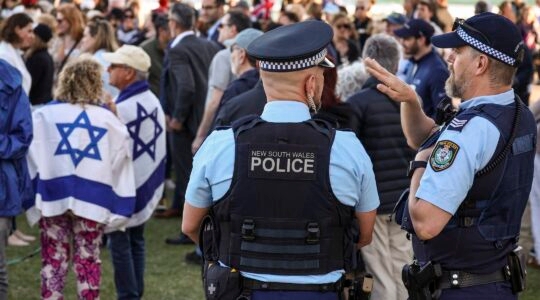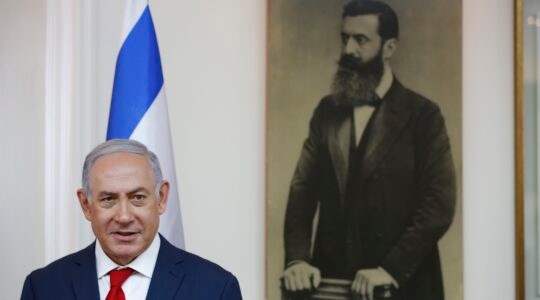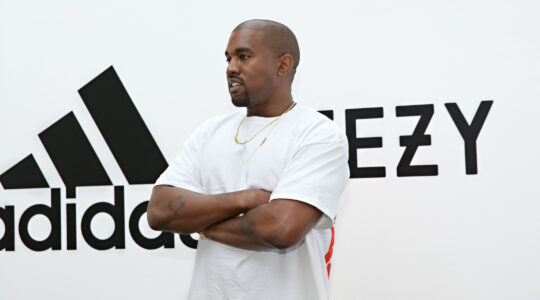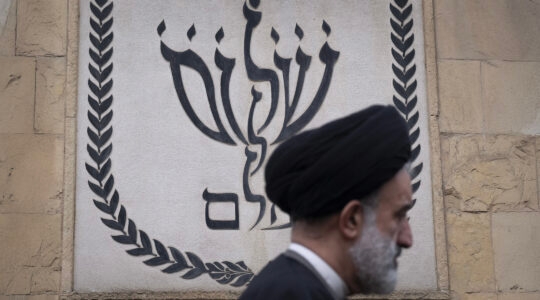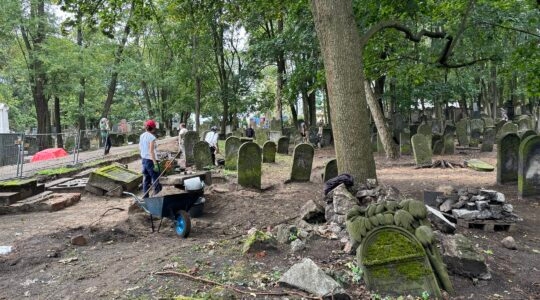MOSCOW (JTA) – The night bus to Limmud Moscow navigates the Friday-night gridlock of Mercedes’ and Range Rovers on Rublovskoye highway, the main thoroughfare to the chateaus of Russia’s oligarchs.
Huddled in the back of the bus, a group of newly minted Limmudniks, as organizers call them, pass the time playing cards and trading the Hebrew phrases they picked up from Birthright Israel trips and Hillel retreats.
It is precisely at the intersection of the young professionals on the back of the bus and the oligarchs on the highway that organizers hope to establish a solid foundation for Limmud in the former Soviet Union.
After three conferences here in two years Limmud – the grassroots, volunteer-driven Jewish learning extravaganza that started in Britain and has spread to Jewish communities around the globe – seems to be catching on in a country where the Jewish community is more accustomed to outside support than homegrown volunteerism and self-sustainability.
“This was completely foreign to them at first,” said Alexander Pyatigorsky, a Limmud council member who recently started his own company in Moscow.
Most Jewish programs in Russia, he said, are “pushed from the top down. Limmud is the opposite; it’s from the ground up.”
Pyatigorsky said the attitude toward volunteerism already has started to shift. Whereas at first Limmud presenters wanted pay, now academics and experts in Jewish life show up at Limmud conferences here without expecting compensation.
Organizers proudly billed last weekend’s conference as the first Limmud event conceived, organized and funded in large part on Russian soil.
Some 230 participants from Moscow paid more than $100 – a significant increase over past Limmuds – to attend the conference at a verdant resort an hour outside the city.
International contributions and low admission fees helped support the two Limmud conferences here last year. But this year the scales are starting to tilt, with only 40 percent of funds coming from overseas, according to Moti Talias, an Israeli consultant brought in by Limmud FSU’s founders to assess progress and provide guidance.
As wealthy Russian Jews see and experience Limmud, Talias says he expects local support to grow.
Limmud “is not something that you sell to someone,” he said. “It’s something that you make yourself and take part in.”
Founded 27 years ago in Britain, local Limmuds rely on volunteers for everything from organization to presentation in putting together gatherings that celebrate Jewish study, fellowship, culture and pluralism.
A sprawling Limmud retreat with more than 700 attendees last October in a Moscow suburb drew dignitaries from every corner of the Russian Jewish community. In a rare show of unity, Rabbi Berel Lazar of the Chabad-led Federation of Jewish Communities and Rabbi Adolf Shayevich of the Congress of Jewish Religious Communities and Organizations of Russia both attended.
Attendees at last weekend’s retreat – one of a series of smaller conferences planned to supplement the bigger annual Limmud event – drew many first-timers, according to conversations with dozens of participants.
Pavel Merchov, 20, a student at Moscow’s Higher School of Economics, had never attended a Limmud event or observed any of the Jewish holidays. That changed this winter.
At his girlfriend’s urging, Merchov traveled to Israel with Birthright Israel, which offers 18- to 26-year-old Diaspora Jews free trips to the Jewish state to boost their connections to Israel and bolster their Jewish identity.
“It’s a small part of the community, and I know a lot of people here,” Merchov said at Limmud. “Now I’ve met a lot more.”
With the relatively small crowd, many attendees ran into people they knew from in between Limmud seminars on everything from Jewish fashion to the army and civil society in Israel. The young crowd mingled well into the wee hours each night over bottles of wine or role-playing games in the hotel’s basement. Saturday night featured a jazz concert.
When planning for the Russian version of Limmud began several years ago, philanthropist Sandra Cahn of New York and Chaim Chesler, an emissary to the region from the Jewish Agency for Israel, relied heavily on $1.2 million in start-up capital and organizational support from outside the former Soviet Union.
“At the beginning we were like blind kittens,” said Anna Smulyanskaya, a member of the conference board. “But now the preparation has been more professional. We know the mistakes that we made.”
Successful in the Moscow area, Limmud now is spreading to elsewhere in the former Soviet Union.
While Limmudniks juggled seminars and flirted across dinner tables, Chesler held late-night meetings with representatives from the World Jewish Congress and the World Congress of Russian-Speaking Jews to discuss future Limmuds.
In October, a Limmud retreat will be held in the city of Yalta on Ukraine’s Crimean Peninsula. The Yalta Limmud will rely in part on the largesse of Vadim Rabinovich, a media mogul and outspoken figure in the Ukrainian Jewish community.
Chesler said he also expects the support of Moshe Kantor, the president of the Russian and European Jewish congresses, who may also give a presentation on his burgeoning collection of Russian art.
The Ukraine Limmud will be followed by a conference in Belarus dedicated entirely to Jewish art and cultural issues. Plans to hold a conference for Russian-speaking Jews in Israel are also taking shape, Chesler said.
Noting that participants in last weekend’s retreat paid their own way, Chesler said he has every intention of fashioning Limmud FSU into an indigenous organization. While Russian donors at first expected some amount of control or recognition for their contributions to the project, that has changed.
“Now,” Chesler said, “they give you a credit line and you go out and do it.”
JTA has documented Jewish history in real-time for over a century. Keep our journalism strong by joining us in supporting independent, award-winning reporting.
